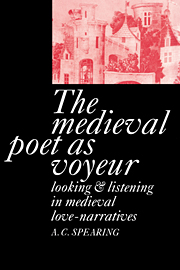Book contents
- Frontmatter
- Contents
- Preface
- 1 Theories of looking
- 2 Examples of looking
- 3 The Tristan story
- 4 Chrétien de Troyes
- 5 The Lanval story
- 6 Troilus and Criseyde and The Manciple's Tale
- 7 Partonope of Blois
- 8 The Knight's Tale and The Merchant's Tale
- 9 The Squyr of Lowe Degre
- 10 The Romaunt of the Rose
- 11 The Parliament of Fowls and A Complaynt of a Loveres Lyfe
- 12 The Palice of Honour and The Goldyn Targe
- 13 The Tretis of the Twa Mariit Wemen and the Wedo
- 14 Phyllyp Sparowe
- Notes
- Bibliography
- Index
7 - Partonope of Blois
Published online by Cambridge University Press: 20 August 2009
- Frontmatter
- Contents
- Preface
- 1 Theories of looking
- 2 Examples of looking
- 3 The Tristan story
- 4 Chrétien de Troyes
- 5 The Lanval story
- 6 Troilus and Criseyde and The Manciple's Tale
- 7 Partonope of Blois
- 8 The Knight's Tale and The Merchant's Tale
- 9 The Squyr of Lowe Degre
- 10 The Romaunt of the Rose
- 11 The Parliament of Fowls and A Complaynt of a Loveres Lyfe
- 12 The Palice of Honour and The Goldyn Targe
- 13 The Tretis of the Twa Mariit Wemen and the Wedo
- 14 Phyllyp Sparowe
- Notes
- Bibliography
- Index
Summary
Chaucer was the most influential of medieval English poets. Much of his influence involved matters of style and tone unrelated to the theme of this book, but, not surprisingly, his successors' reception of Troilus and Criseyde sometimes stimulated further developments in the treatment of looking and listening. One of the most interesting cases is Partonope of Blois, a romance dating from the early fifteenth century – evidently quite a popular one, surviving in at least five manuscripts, with some marked differences among the versions. It is translated, often freely, from Partonopeus de Blois, an even more popular twelfth-century French romance – one scholar describes it as being, for its contemporaries, of equal importance to the stories of Tristan and of the Grail. The translator's identity is unknown, but it is unmistakably clear that he had read and learned from Chaucer, and especially from Troilus and Criseyde. Besides many recollections of Chaucerian phrases, the translator had learned from Chaucer a way of representing himself as a translator: that is, as a secret intruder in and commentator on the often private world of the French narrative. In doing so, he takes up Chaucer's contrast between sentement and written sources, observing that while the French poet
tellyth hys tale of sentament,
I vnder-stonde no3th hys entent,
Ne wolle ne besy me to lere.
(2347–9)- Type
- Chapter
- Information
- The Medieval Poet as Voyeur , pp. 140 - 154Publisher: Cambridge University PressPrint publication year: 1993



